Unit 11 Organisational Behaviour Report: A David and Co. Analysis
VerifiedAdded on 2020/12/29
|14
|3807
|86
Report
AI Summary
This report provides an in-depth analysis of organisational behaviour within the context of A David and Co., a food and beverage company. It explores how culture, power, and politics influence individual and team performance, utilizing Handy's cultural typology. The report examines the impact of these factors on employee morale, productivity, and organizational profitability. It further investigates content and process theories of motivation, including Maslow's hierarchy of needs, McClelland's needs theory, Vroom's expectancy theory, and Adam's equity theory, and how these theories can be applied to influence employee behaviour and achieve organizational goals. The report also differentiates between effective and ineffective teams, highlighting the roles of management and project teams and discussing Tuckman's group development theory. Finally, it delves into the concepts and philosophies of organisational behaviour, analyzing their positive and negative impacts on the workplace and employee motivation.
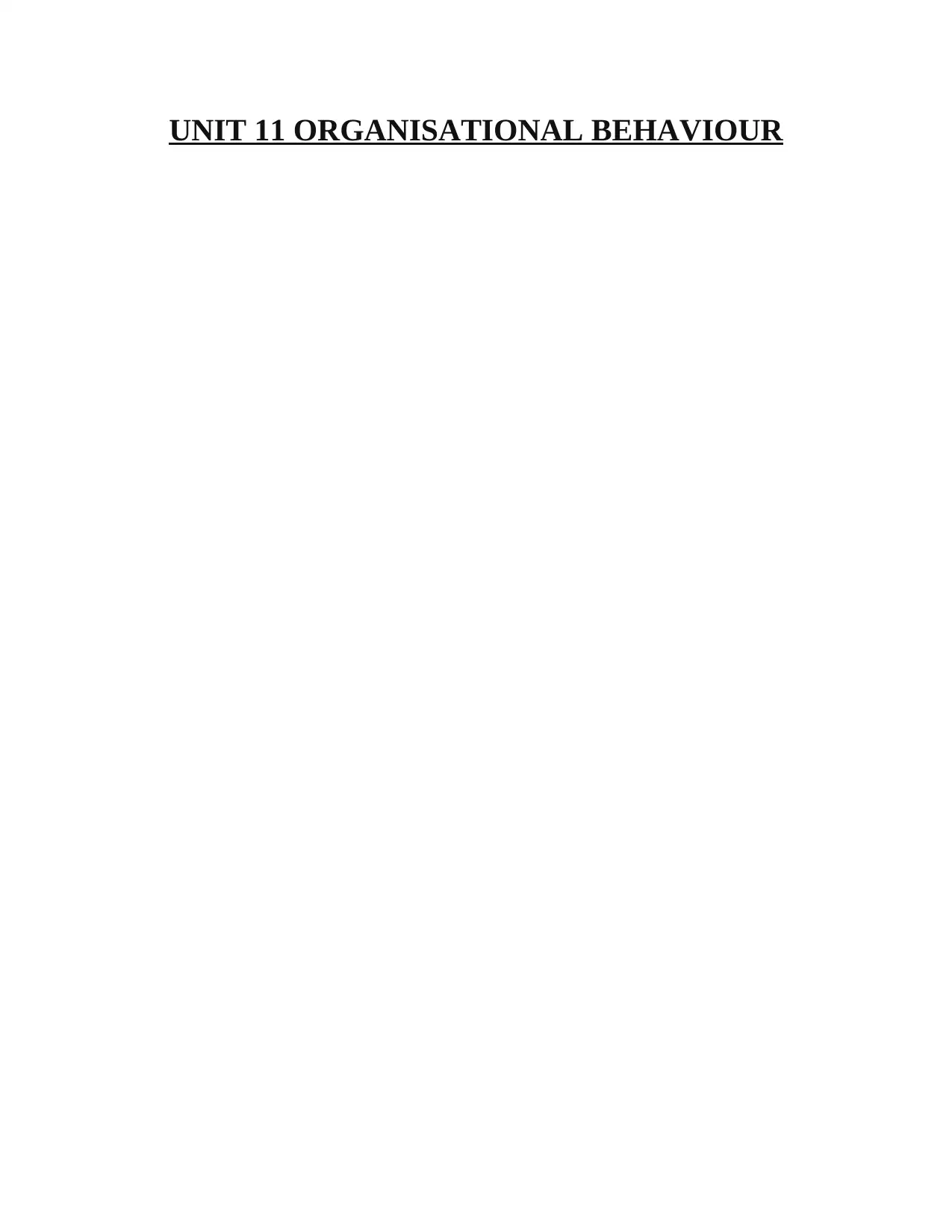
UNIT 11 ORGANISATIONAL BEHAVIOUR
Paraphrase This Document
Need a fresh take? Get an instant paraphrase of this document with our AI Paraphraser
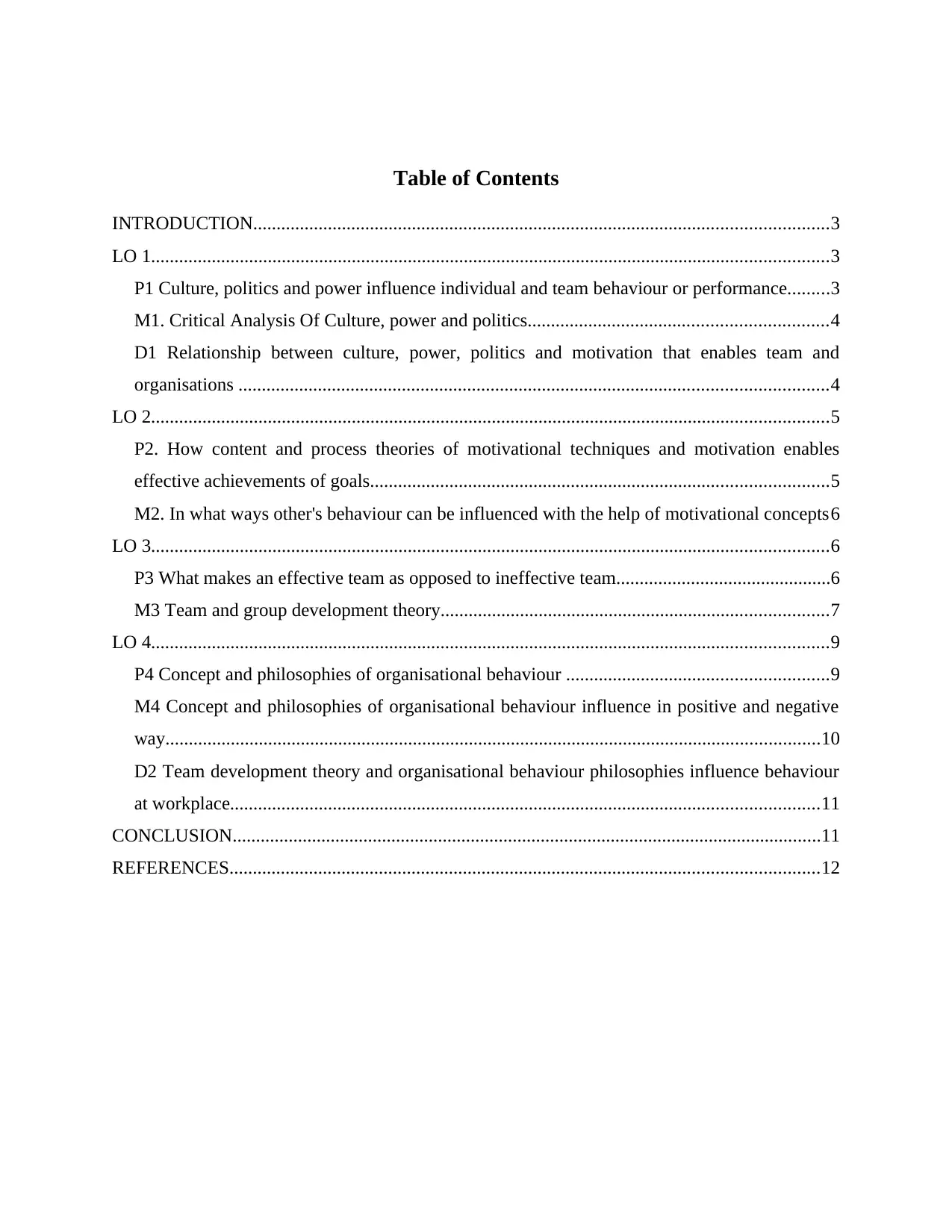
Table of Contents
INTRODUCTION...........................................................................................................................3
LO 1.................................................................................................................................................3
P1 Culture, politics and power influence individual and team behaviour or performance.........3
M1. Critical Analysis Of Culture, power and politics................................................................4
D1 Relationship between culture, power, politics and motivation that enables team and
organisations ..............................................................................................................................4
LO 2.................................................................................................................................................5
P2. How content and process theories of motivational techniques and motivation enables
effective achievements of goals..................................................................................................5
M2. In what ways other's behaviour can be influenced with the help of motivational concepts6
LO 3.................................................................................................................................................6
P3 What makes an effective team as opposed to ineffective team..............................................6
M3 Team and group development theory...................................................................................7
LO 4.................................................................................................................................................9
P4 Concept and philosophies of organisational behaviour ........................................................9
M4 Concept and philosophies of organisational behaviour influence in positive and negative
way............................................................................................................................................10
D2 Team development theory and organisational behaviour philosophies influence behaviour
at workplace..............................................................................................................................11
CONCLUSION..............................................................................................................................11
REFERENCES..............................................................................................................................12
INTRODUCTION...........................................................................................................................3
LO 1.................................................................................................................................................3
P1 Culture, politics and power influence individual and team behaviour or performance.........3
M1. Critical Analysis Of Culture, power and politics................................................................4
D1 Relationship between culture, power, politics and motivation that enables team and
organisations ..............................................................................................................................4
LO 2.................................................................................................................................................5
P2. How content and process theories of motivational techniques and motivation enables
effective achievements of goals..................................................................................................5
M2. In what ways other's behaviour can be influenced with the help of motivational concepts6
LO 3.................................................................................................................................................6
P3 What makes an effective team as opposed to ineffective team..............................................6
M3 Team and group development theory...................................................................................7
LO 4.................................................................................................................................................9
P4 Concept and philosophies of organisational behaviour ........................................................9
M4 Concept and philosophies of organisational behaviour influence in positive and negative
way............................................................................................................................................10
D2 Team development theory and organisational behaviour philosophies influence behaviour
at workplace..............................................................................................................................11
CONCLUSION..............................................................................................................................11
REFERENCES..............................................................................................................................12
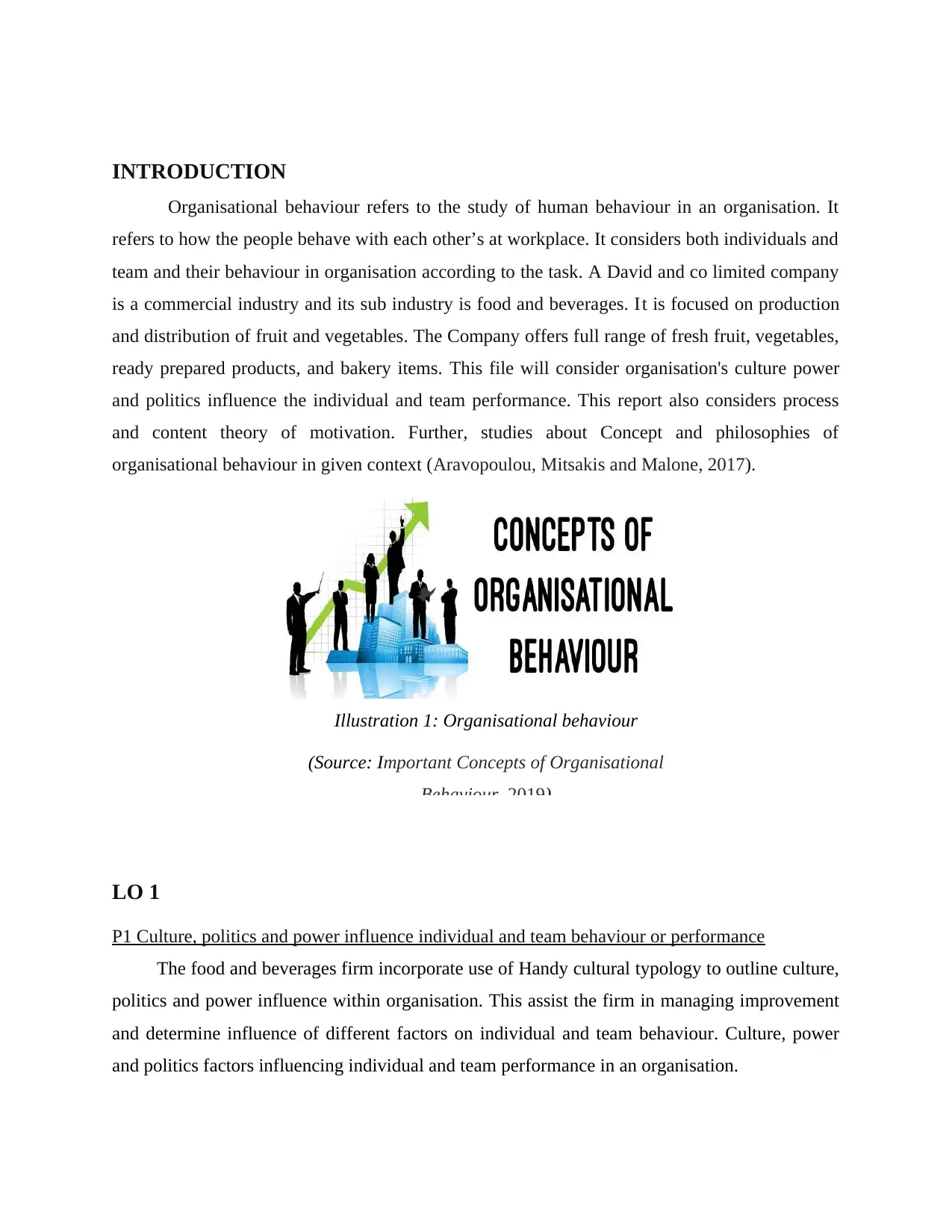
INTRODUCTION
Organisational behaviour refers to the study of human behaviour in an organisation. It
refers to how the people behave with each other’s at workplace. It considers both individuals and
team and their behaviour in organisation according to the task. A David and co limited company
is a commercial industry and its sub industry is food and beverages. It is focused on production
and distribution of fruit and vegetables. The Company offers full range of fresh fruit, vegetables,
ready prepared products, and bakery items. This file will consider organisation's culture power
and politics influence the individual and team performance. This report also considers process
and content theory of motivation. Further, studies about Concept and philosophies of
organisational behaviour in given context (Aravopoulou, Mitsakis and Malone, 2017).
LO 1
P1 Culture, politics and power influence individual and team behaviour or performance
The food and beverages firm incorporate use of Handy cultural typology to outline culture,
politics and power influence within organisation. This assist the firm in managing improvement
and determine influence of different factors on individual and team behaviour. Culture, power
and politics factors influencing individual and team performance in an organisation.
Illustration 1: Organisational behaviour
(Source: Important Concepts of Organisational
Behaviour, 2019)
Organisational behaviour refers to the study of human behaviour in an organisation. It
refers to how the people behave with each other’s at workplace. It considers both individuals and
team and their behaviour in organisation according to the task. A David and co limited company
is a commercial industry and its sub industry is food and beverages. It is focused on production
and distribution of fruit and vegetables. The Company offers full range of fresh fruit, vegetables,
ready prepared products, and bakery items. This file will consider organisation's culture power
and politics influence the individual and team performance. This report also considers process
and content theory of motivation. Further, studies about Concept and philosophies of
organisational behaviour in given context (Aravopoulou, Mitsakis and Malone, 2017).
LO 1
P1 Culture, politics and power influence individual and team behaviour or performance
The food and beverages firm incorporate use of Handy cultural typology to outline culture,
politics and power influence within organisation. This assist the firm in managing improvement
and determine influence of different factors on individual and team behaviour. Culture, power
and politics factors influencing individual and team performance in an organisation.
Illustration 1: Organisational behaviour
(Source: Important Concepts of Organisational
Behaviour, 2019)
⊘ This is a preview!⊘
Do you want full access?
Subscribe today to unlock all pages.

Trusted by 1+ million students worldwide
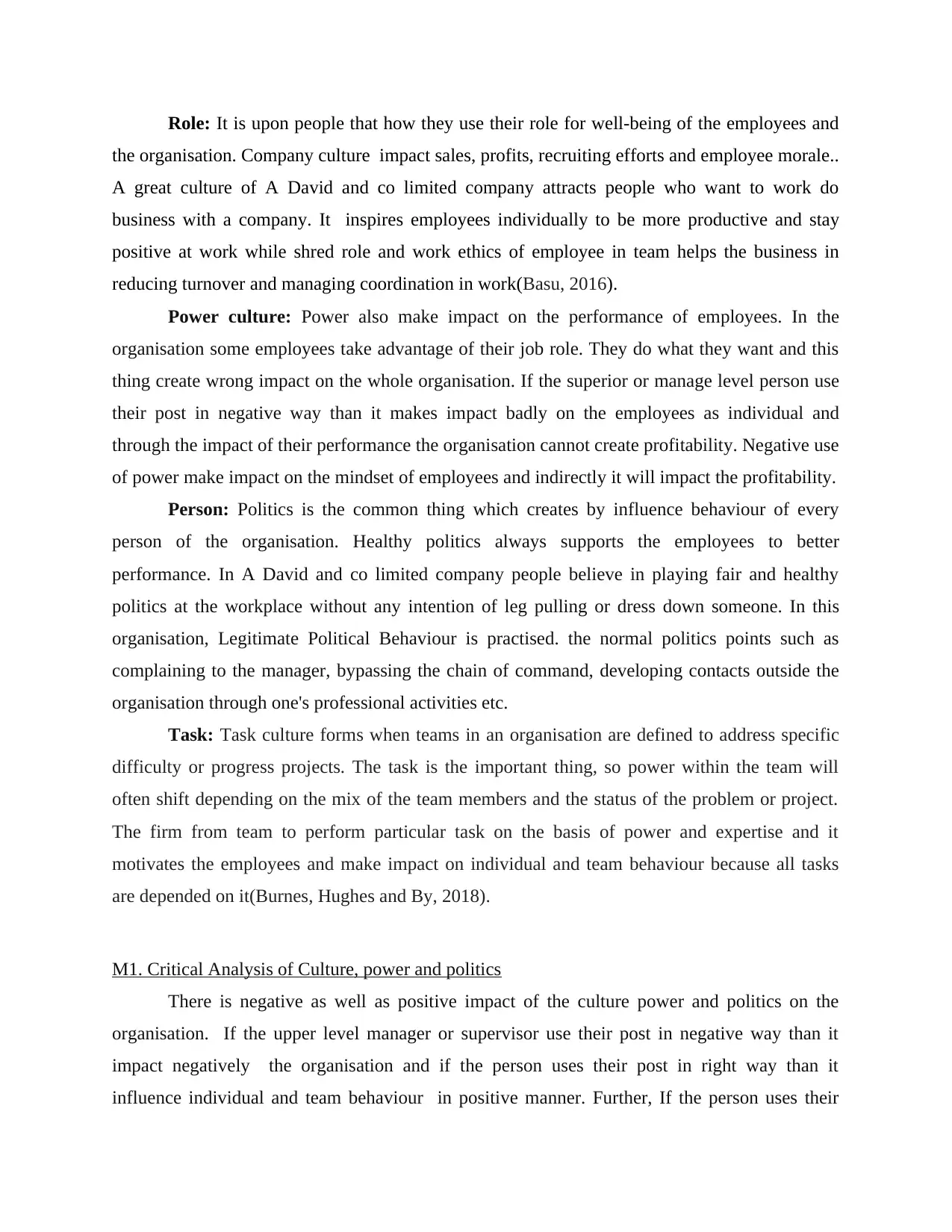
Role: It is upon people that how they use their role for well-being of the employees and
the organisation. Company culture impact sales, profits, recruiting efforts and employee morale..
A great culture of A David and co limited company attracts people who want to work do
business with a company. It inspires employees individually to be more productive and stay
positive at work while shred role and work ethics of employee in team helps the business in
reducing turnover and managing coordination in work(Basu, 2016).
Power culture: Power also make impact on the performance of employees. In the
organisation some employees take advantage of their job role. They do what they want and this
thing create wrong impact on the whole organisation. If the superior or manage level person use
their post in negative way than it makes impact badly on the employees as individual and
through the impact of their performance the organisation cannot create profitability. Negative use
of power make impact on the mindset of employees and indirectly it will impact the profitability.
Person: Politics is the common thing which creates by influence behaviour of every
person of the organisation. Healthy politics always supports the employees to better
performance. In A David and co limited company people believe in playing fair and healthy
politics at the workplace without any intention of leg pulling or dress down someone. In this
organisation, Legitimate Political Behaviour is practised. the normal politics points such as
complaining to the manager, bypassing the chain of command, developing contacts outside the
organisation through one's professional activities etc.
Task: Task culture forms when teams in an organisation are defined to address specific
difficulty or progress projects. The task is the important thing, so power within the team will
often shift depending on the mix of the team members and the status of the problem or project.
The firm from team to perform particular task on the basis of power and expertise and it
motivates the employees and make impact on individual and team behaviour because all tasks
are depended on it(Burnes, Hughes and By, 2018).
M1. Critical Analysis of Culture, power and politics
There is negative as well as positive impact of the culture power and politics on the
organisation. If the upper level manager or supervisor use their post in negative way than it
impact negatively the organisation and if the person uses their post in right way than it
influence individual and team behaviour in positive manner. Further, If the person uses their
the organisation. Company culture impact sales, profits, recruiting efforts and employee morale..
A great culture of A David and co limited company attracts people who want to work do
business with a company. It inspires employees individually to be more productive and stay
positive at work while shred role and work ethics of employee in team helps the business in
reducing turnover and managing coordination in work(Basu, 2016).
Power culture: Power also make impact on the performance of employees. In the
organisation some employees take advantage of their job role. They do what they want and this
thing create wrong impact on the whole organisation. If the superior or manage level person use
their post in negative way than it makes impact badly on the employees as individual and
through the impact of their performance the organisation cannot create profitability. Negative use
of power make impact on the mindset of employees and indirectly it will impact the profitability.
Person: Politics is the common thing which creates by influence behaviour of every
person of the organisation. Healthy politics always supports the employees to better
performance. In A David and co limited company people believe in playing fair and healthy
politics at the workplace without any intention of leg pulling or dress down someone. In this
organisation, Legitimate Political Behaviour is practised. the normal politics points such as
complaining to the manager, bypassing the chain of command, developing contacts outside the
organisation through one's professional activities etc.
Task: Task culture forms when teams in an organisation are defined to address specific
difficulty or progress projects. The task is the important thing, so power within the team will
often shift depending on the mix of the team members and the status of the problem or project.
The firm from team to perform particular task on the basis of power and expertise and it
motivates the employees and make impact on individual and team behaviour because all tasks
are depended on it(Burnes, Hughes and By, 2018).
M1. Critical Analysis of Culture, power and politics
There is negative as well as positive impact of the culture power and politics on the
organisation. If the upper level manager or supervisor use their post in negative way than it
impact negatively the organisation and if the person uses their post in right way than it
influence individual and team behaviour in positive manner. Further, If the person uses their
Paraphrase This Document
Need a fresh take? Get an instant paraphrase of this document with our AI Paraphraser
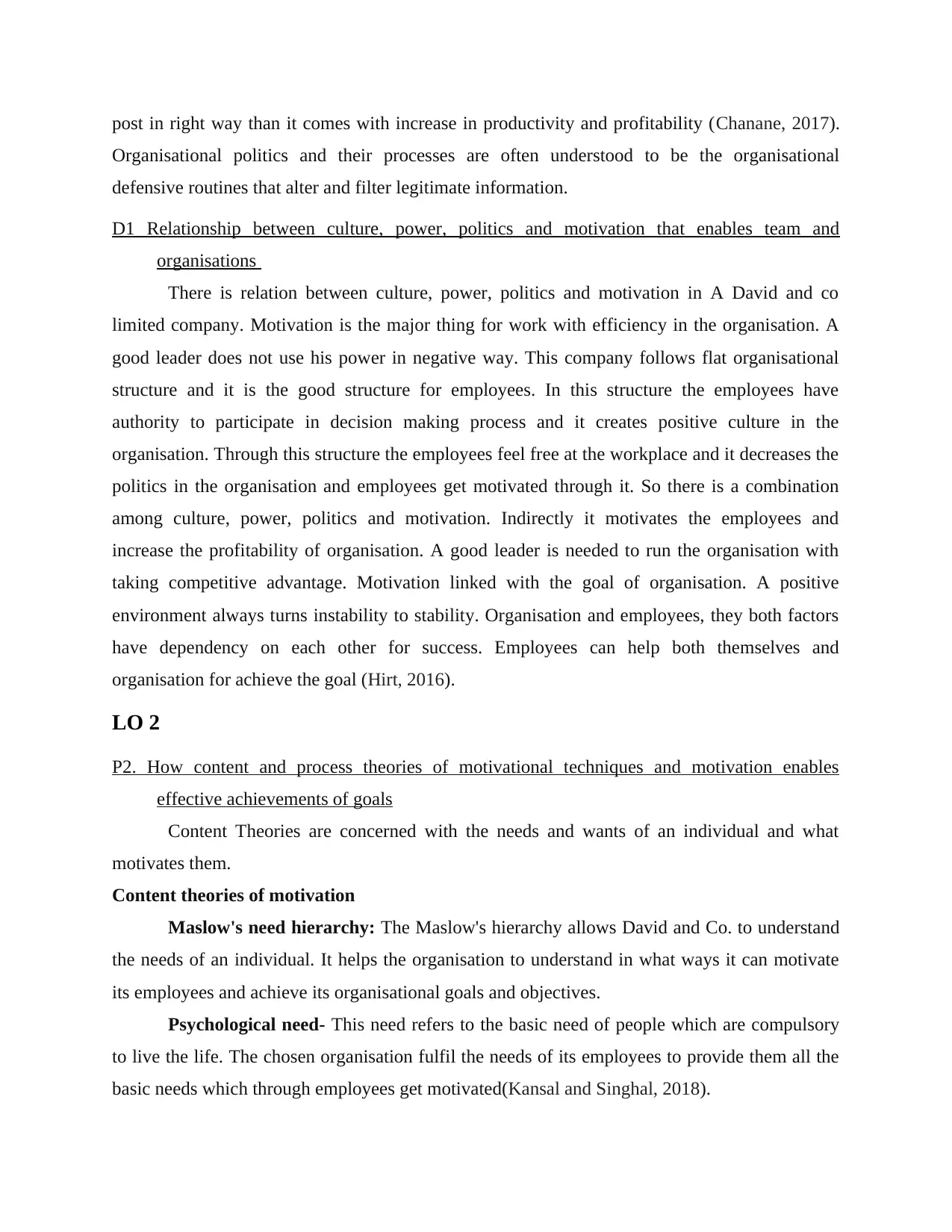
post in right way than it comes with increase in productivity and profitability (Chanane, 2017).
Organisational politics and their processes are often understood to be the organisational
defensive routines that alter and filter legitimate information.
D1 Relationship between culture, power, politics and motivation that enables team and
organisations
There is relation between culture, power, politics and motivation in A David and co
limited company. Motivation is the major thing for work with efficiency in the organisation. A
good leader does not use his power in negative way. This company follows flat organisational
structure and it is the good structure for employees. In this structure the employees have
authority to participate in decision making process and it creates positive culture in the
organisation. Through this structure the employees feel free at the workplace and it decreases the
politics in the organisation and employees get motivated through it. So there is a combination
among culture, power, politics and motivation. Indirectly it motivates the employees and
increase the profitability of organisation. A good leader is needed to run the organisation with
taking competitive advantage. Motivation linked with the goal of organisation. A positive
environment always turns instability to stability. Organisation and employees, they both factors
have dependency on each other for success. Employees can help both themselves and
organisation for achieve the goal (Hirt, 2016).
LO 2
P2. How content and process theories of motivational techniques and motivation enables
effective achievements of goals
Content Theories are concerned with the needs and wants of an individual and what
motivates them.
Content theories of motivation
Maslow's need hierarchy: The Maslow's hierarchy allows David and Co. to understand
the needs of an individual. It helps the organisation to understand in what ways it can motivate
its employees and achieve its organisational goals and objectives.
Psychological need- This need refers to the basic need of people which are compulsory
to live the life. The chosen organisation fulfil the needs of its employees to provide them all the
basic needs which through employees get motivated(Kansal and Singhal, 2018).
Organisational politics and their processes are often understood to be the organisational
defensive routines that alter and filter legitimate information.
D1 Relationship between culture, power, politics and motivation that enables team and
organisations
There is relation between culture, power, politics and motivation in A David and co
limited company. Motivation is the major thing for work with efficiency in the organisation. A
good leader does not use his power in negative way. This company follows flat organisational
structure and it is the good structure for employees. In this structure the employees have
authority to participate in decision making process and it creates positive culture in the
organisation. Through this structure the employees feel free at the workplace and it decreases the
politics in the organisation and employees get motivated through it. So there is a combination
among culture, power, politics and motivation. Indirectly it motivates the employees and
increase the profitability of organisation. A good leader is needed to run the organisation with
taking competitive advantage. Motivation linked with the goal of organisation. A positive
environment always turns instability to stability. Organisation and employees, they both factors
have dependency on each other for success. Employees can help both themselves and
organisation for achieve the goal (Hirt, 2016).
LO 2
P2. How content and process theories of motivational techniques and motivation enables
effective achievements of goals
Content Theories are concerned with the needs and wants of an individual and what
motivates them.
Content theories of motivation
Maslow's need hierarchy: The Maslow's hierarchy allows David and Co. to understand
the needs of an individual. It helps the organisation to understand in what ways it can motivate
its employees and achieve its organisational goals and objectives.
Psychological need- This need refers to the basic need of people which are compulsory
to live the life. The chosen organisation fulfil the needs of its employees to provide them all the
basic needs which through employees get motivated(Kansal and Singhal, 2018).
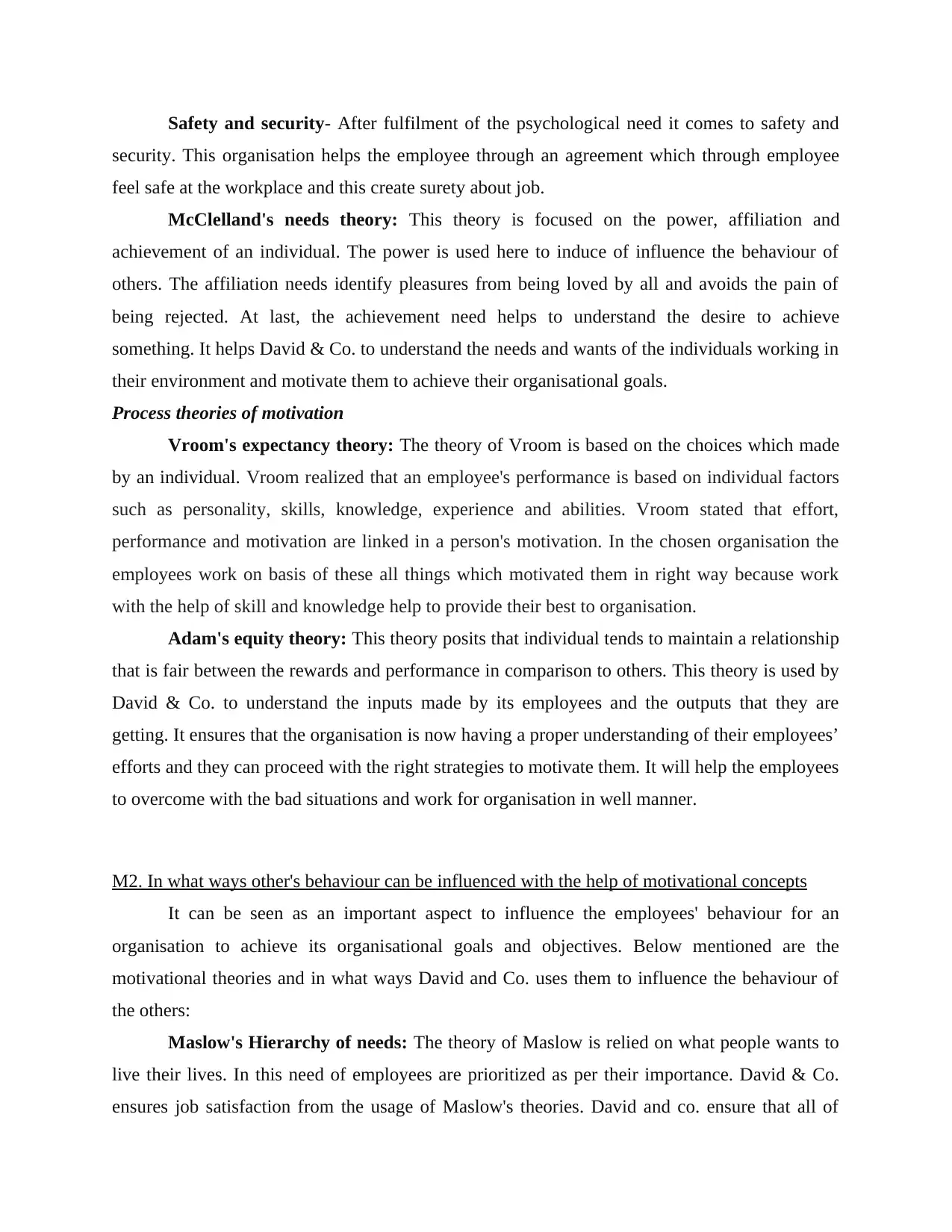
Safety and security- After fulfilment of the psychological need it comes to safety and
security. This organisation helps the employee through an agreement which through employee
feel safe at the workplace and this create surety about job.
McClelland's needs theory: This theory is focused on the power, affiliation and
achievement of an individual. The power is used here to induce of influence the behaviour of
others. The affiliation needs identify pleasures from being loved by all and avoids the pain of
being rejected. At last, the achievement need helps to understand the desire to achieve
something. It helps David & Co. to understand the needs and wants of the individuals working in
their environment and motivate them to achieve their organisational goals.
Process theories of motivation
Vroom's expectancy theory: The theory of Vroom is based on the choices which made
by an individual. Vroom realized that an employee's performance is based on individual factors
such as personality, skills, knowledge, experience and abilities. Vroom stated that effort,
performance and motivation are linked in a person's motivation. In the chosen organisation the
employees work on basis of these all things which motivated them in right way because work
with the help of skill and knowledge help to provide their best to organisation.
Adam's equity theory: This theory posits that individual tends to maintain a relationship
that is fair between the rewards and performance in comparison to others. This theory is used by
David & Co. to understand the inputs made by its employees and the outputs that they are
getting. It ensures that the organisation is now having a proper understanding of their employees’
efforts and they can proceed with the right strategies to motivate them. It will help the employees
to overcome with the bad situations and work for organisation in well manner.
M2. In what ways other's behaviour can be influenced with the help of motivational concepts
It can be seen as an important aspect to influence the employees' behaviour for an
organisation to achieve its organisational goals and objectives. Below mentioned are the
motivational theories and in what ways David and Co. uses them to influence the behaviour of
the others:
Maslow's Hierarchy of needs: The theory of Maslow is relied on what people wants to
live their lives. In this need of employees are prioritized as per their importance. David & Co.
ensures job satisfaction from the usage of Maslow's theories. David and co. ensure that all of
security. This organisation helps the employee through an agreement which through employee
feel safe at the workplace and this create surety about job.
McClelland's needs theory: This theory is focused on the power, affiliation and
achievement of an individual. The power is used here to induce of influence the behaviour of
others. The affiliation needs identify pleasures from being loved by all and avoids the pain of
being rejected. At last, the achievement need helps to understand the desire to achieve
something. It helps David & Co. to understand the needs and wants of the individuals working in
their environment and motivate them to achieve their organisational goals.
Process theories of motivation
Vroom's expectancy theory: The theory of Vroom is based on the choices which made
by an individual. Vroom realized that an employee's performance is based on individual factors
such as personality, skills, knowledge, experience and abilities. Vroom stated that effort,
performance and motivation are linked in a person's motivation. In the chosen organisation the
employees work on basis of these all things which motivated them in right way because work
with the help of skill and knowledge help to provide their best to organisation.
Adam's equity theory: This theory posits that individual tends to maintain a relationship
that is fair between the rewards and performance in comparison to others. This theory is used by
David & Co. to understand the inputs made by its employees and the outputs that they are
getting. It ensures that the organisation is now having a proper understanding of their employees’
efforts and they can proceed with the right strategies to motivate them. It will help the employees
to overcome with the bad situations and work for organisation in well manner.
M2. In what ways other's behaviour can be influenced with the help of motivational concepts
It can be seen as an important aspect to influence the employees' behaviour for an
organisation to achieve its organisational goals and objectives. Below mentioned are the
motivational theories and in what ways David and Co. uses them to influence the behaviour of
the others:
Maslow's Hierarchy of needs: The theory of Maslow is relied on what people wants to
live their lives. In this need of employees are prioritized as per their importance. David & Co.
ensures job satisfaction from the usage of Maslow's theories. David and co. ensure that all of
⊘ This is a preview!⊘
Do you want full access?
Subscribe today to unlock all pages.

Trusted by 1+ million students worldwide
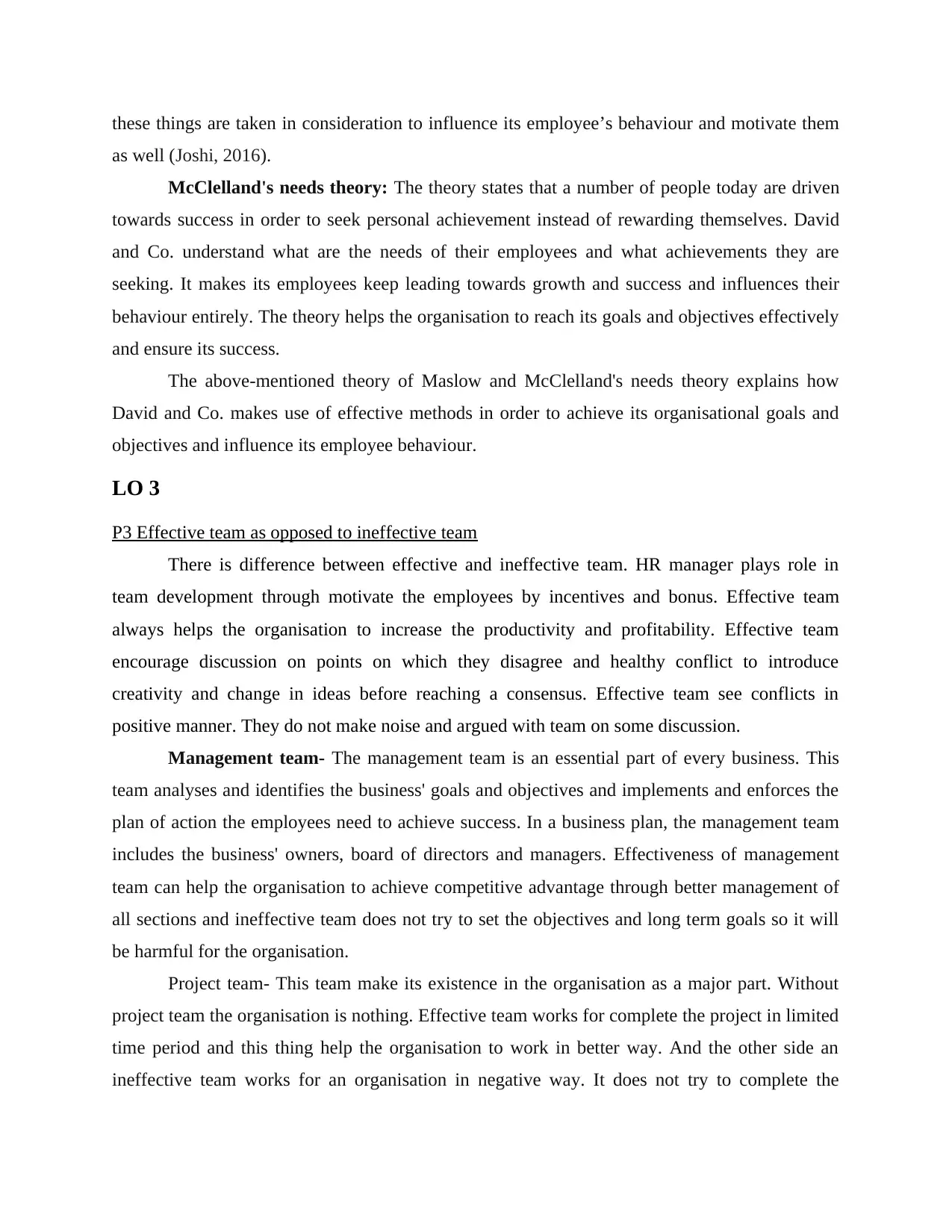
these things are taken in consideration to influence its employee’s behaviour and motivate them
as well (Joshi, 2016).
McClelland's needs theory: The theory states that a number of people today are driven
towards success in order to seek personal achievement instead of rewarding themselves. David
and Co. understand what are the needs of their employees and what achievements they are
seeking. It makes its employees keep leading towards growth and success and influences their
behaviour entirely. The theory helps the organisation to reach its goals and objectives effectively
and ensure its success.
The above-mentioned theory of Maslow and McClelland's needs theory explains how
David and Co. makes use of effective methods in order to achieve its organisational goals and
objectives and influence its employee behaviour.
LO 3
P3 Effective team as opposed to ineffective team
There is difference between effective and ineffective team. HR manager plays role in
team development through motivate the employees by incentives and bonus. Effective team
always helps the organisation to increase the productivity and profitability. Effective team
encourage discussion on points on which they disagree and healthy conflict to introduce
creativity and change in ideas before reaching a consensus. Effective team see conflicts in
positive manner. They do not make noise and argued with team on some discussion.
Management team- The management team is an essential part of every business. This
team analyses and identifies the business' goals and objectives and implements and enforces the
plan of action the employees need to achieve success. In a business plan, the management team
includes the business' owners, board of directors and managers. Effectiveness of management
team can help the organisation to achieve competitive advantage through better management of
all sections and ineffective team does not try to set the objectives and long term goals so it will
be harmful for the organisation.
Project team- This team make its existence in the organisation as a major part. Without
project team the organisation is nothing. Effective team works for complete the project in limited
time period and this thing help the organisation to work in better way. And the other side an
ineffective team works for an organisation in negative way. It does not try to complete the
as well (Joshi, 2016).
McClelland's needs theory: The theory states that a number of people today are driven
towards success in order to seek personal achievement instead of rewarding themselves. David
and Co. understand what are the needs of their employees and what achievements they are
seeking. It makes its employees keep leading towards growth and success and influences their
behaviour entirely. The theory helps the organisation to reach its goals and objectives effectively
and ensure its success.
The above-mentioned theory of Maslow and McClelland's needs theory explains how
David and Co. makes use of effective methods in order to achieve its organisational goals and
objectives and influence its employee behaviour.
LO 3
P3 Effective team as opposed to ineffective team
There is difference between effective and ineffective team. HR manager plays role in
team development through motivate the employees by incentives and bonus. Effective team
always helps the organisation to increase the productivity and profitability. Effective team
encourage discussion on points on which they disagree and healthy conflict to introduce
creativity and change in ideas before reaching a consensus. Effective team see conflicts in
positive manner. They do not make noise and argued with team on some discussion.
Management team- The management team is an essential part of every business. This
team analyses and identifies the business' goals and objectives and implements and enforces the
plan of action the employees need to achieve success. In a business plan, the management team
includes the business' owners, board of directors and managers. Effectiveness of management
team can help the organisation to achieve competitive advantage through better management of
all sections and ineffective team does not try to set the objectives and long term goals so it will
be harmful for the organisation.
Project team- This team make its existence in the organisation as a major part. Without
project team the organisation is nothing. Effective team works for complete the project in limited
time period and this thing help the organisation to work in better way. And the other side an
ineffective team works for an organisation in negative way. It does not try to complete the
Paraphrase This Document
Need a fresh take? Get an instant paraphrase of this document with our AI Paraphraser
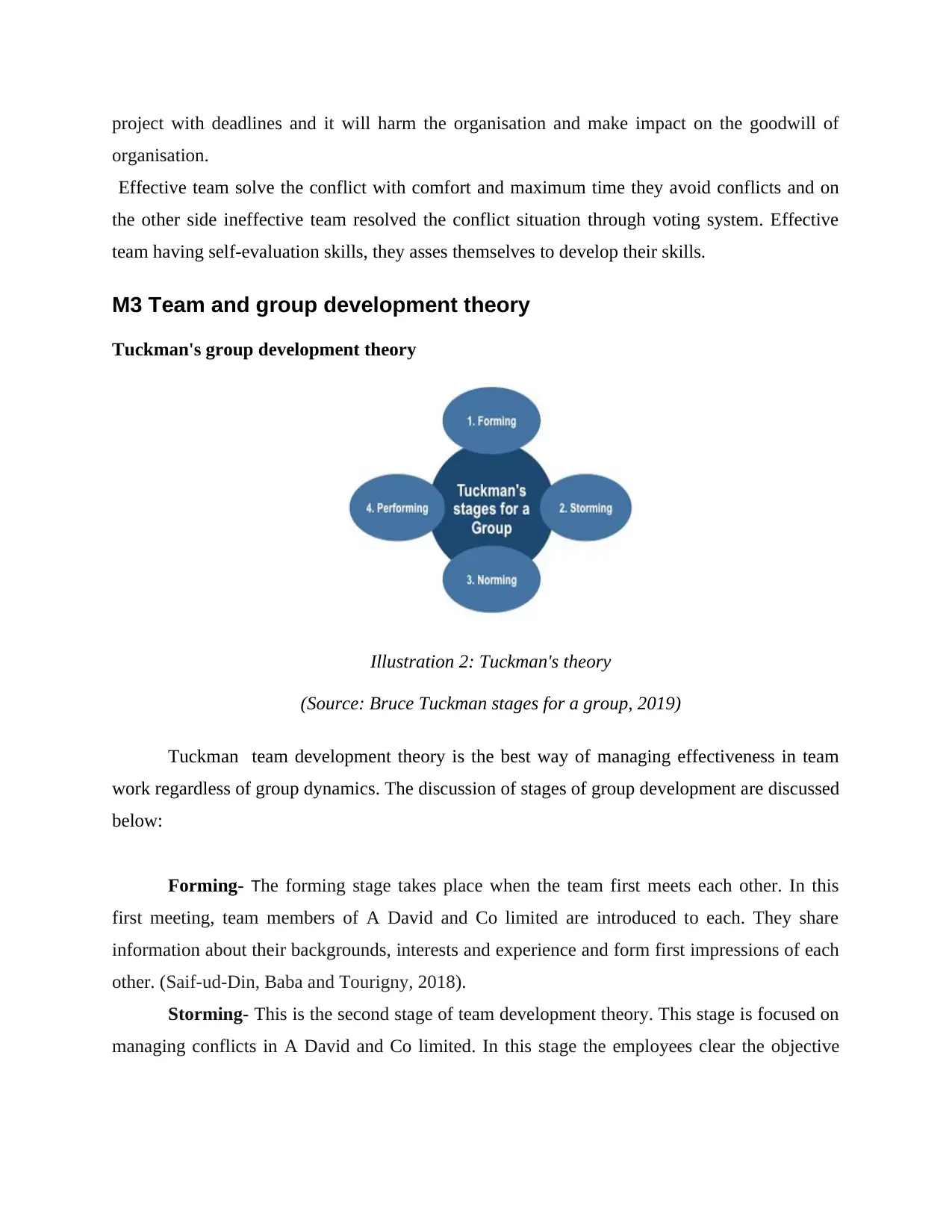
project with deadlines and it will harm the organisation and make impact on the goodwill of
organisation.
Effective team solve the conflict with comfort and maximum time they avoid conflicts and on
the other side ineffective team resolved the conflict situation through voting system. Effective
team having self-evaluation skills, they asses themselves to develop their skills.
M3 Team and group development theory
Tuckman's group development theory
Tuckman team development theory is the best way of managing effectiveness in team
work regardless of group dynamics. The discussion of stages of group development are discussed
below:
Forming- The forming stage takes place when the team first meets each other. In this
first meeting, team members of A David and Co limited are introduced to each. They share
information about their backgrounds, interests and experience and form first impressions of each
other. (Saif-ud-Din, Baba and Tourigny, 2018).
Storming- This is the second stage of team development theory. This stage is focused on
managing conflicts in A David and Co limited. In this stage the employees clear the objective
Illustration 2: Tuckman's theory
(Source: Bruce Tuckman stages for a group, 2019)
organisation.
Effective team solve the conflict with comfort and maximum time they avoid conflicts and on
the other side ineffective team resolved the conflict situation through voting system. Effective
team having self-evaluation skills, they asses themselves to develop their skills.
M3 Team and group development theory
Tuckman's group development theory
Tuckman team development theory is the best way of managing effectiveness in team
work regardless of group dynamics. The discussion of stages of group development are discussed
below:
Forming- The forming stage takes place when the team first meets each other. In this
first meeting, team members of A David and Co limited are introduced to each. They share
information about their backgrounds, interests and experience and form first impressions of each
other. (Saif-ud-Din, Baba and Tourigny, 2018).
Storming- This is the second stage of team development theory. This stage is focused on
managing conflicts in A David and Co limited. In this stage the employees clear the objective
Illustration 2: Tuckman's theory
(Source: Bruce Tuckman stages for a group, 2019)
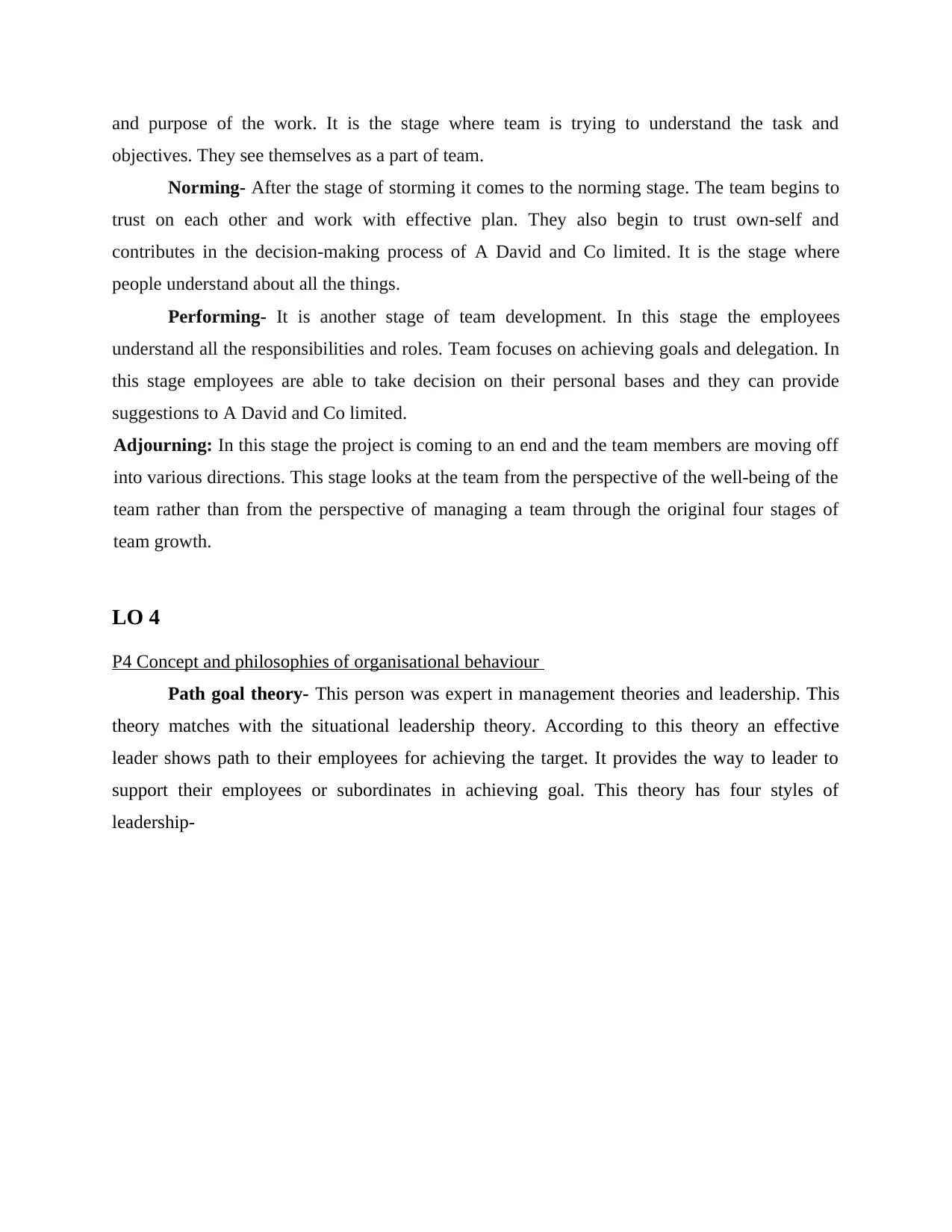
and purpose of the work. It is the stage where team is trying to understand the task and
objectives. They see themselves as a part of team.
Norming- After the stage of storming it comes to the norming stage. The team begins to
trust on each other and work with effective plan. They also begin to trust own-self and
contributes in the decision-making process of A David and Co limited. It is the stage where
people understand about all the things.
Performing- It is another stage of team development. In this stage the employees
understand all the responsibilities and roles. Team focuses on achieving goals and delegation. In
this stage employees are able to take decision on their personal bases and they can provide
suggestions to A David and Co limited.
Adjourning: In this stage the project is coming to an end and the team members are moving off
into various directions. This stage looks at the team from the perspective of the well-being of the
team rather than from the perspective of managing a team through the original four stages of
team growth.
LO 4
P4 Concept and philosophies of organisational behaviour
Path goal theory- This person was expert in management theories and leadership. This
theory matches with the situational leadership theory. According to this theory an effective
leader shows path to their employees for achieving the target. It provides the way to leader to
support their employees or subordinates in achieving goal. This theory has four styles of
leadership-
objectives. They see themselves as a part of team.
Norming- After the stage of storming it comes to the norming stage. The team begins to
trust on each other and work with effective plan. They also begin to trust own-self and
contributes in the decision-making process of A David and Co limited. It is the stage where
people understand about all the things.
Performing- It is another stage of team development. In this stage the employees
understand all the responsibilities and roles. Team focuses on achieving goals and delegation. In
this stage employees are able to take decision on their personal bases and they can provide
suggestions to A David and Co limited.
Adjourning: In this stage the project is coming to an end and the team members are moving off
into various directions. This stage looks at the team from the perspective of the well-being of the
team rather than from the perspective of managing a team through the original four stages of
team growth.
LO 4
P4 Concept and philosophies of organisational behaviour
Path goal theory- This person was expert in management theories and leadership. This
theory matches with the situational leadership theory. According to this theory an effective
leader shows path to their employees for achieving the target. It provides the way to leader to
support their employees or subordinates in achieving goal. This theory has four styles of
leadership-
⊘ This is a preview!⊘
Do you want full access?
Subscribe today to unlock all pages.

Trusted by 1+ million students worldwide
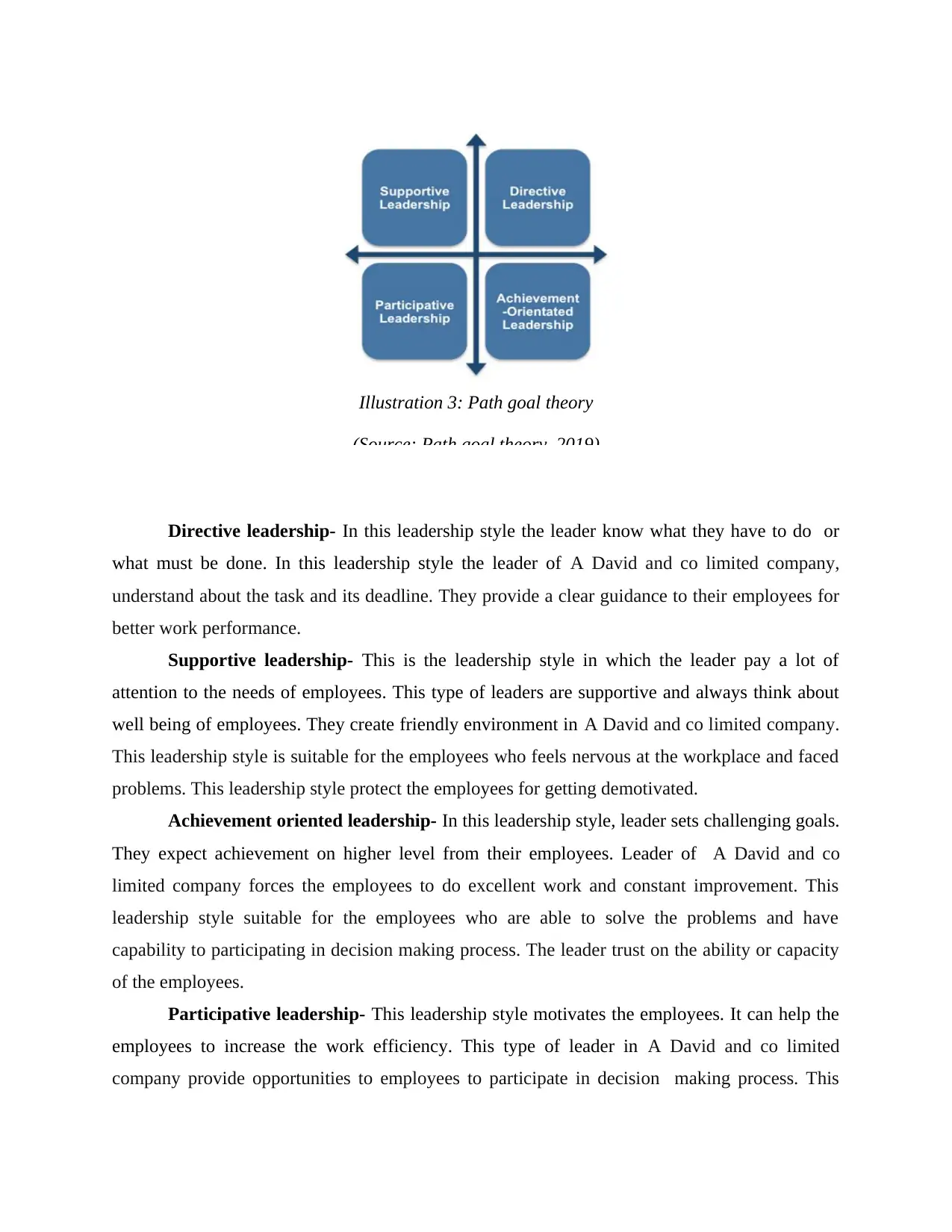
Directive leadership- In this leadership style the leader know what they have to do or
what must be done. In this leadership style the leader of A David and co limited company,
understand about the task and its deadline. They provide a clear guidance to their employees for
better work performance.
Supportive leadership- This is the leadership style in which the leader pay a lot of
attention to the needs of employees. This type of leaders are supportive and always think about
well being of employees. They create friendly environment in A David and co limited company.
This leadership style is suitable for the employees who feels nervous at the workplace and faced
problems. This leadership style protect the employees for getting demotivated.
Achievement oriented leadership- In this leadership style, leader sets challenging goals.
They expect achievement on higher level from their employees. Leader of A David and co
limited company forces the employees to do excellent work and constant improvement. This
leadership style suitable for the employees who are able to solve the problems and have
capability to participating in decision making process. The leader trust on the ability or capacity
of the employees.
Participative leadership- This leadership style motivates the employees. It can help the
employees to increase the work efficiency. This type of leader in A David and co limited
company provide opportunities to employees to participate in decision making process. This
Illustration 3: Path goal theory
(Source: Path goal theory, 2019)
what must be done. In this leadership style the leader of A David and co limited company,
understand about the task and its deadline. They provide a clear guidance to their employees for
better work performance.
Supportive leadership- This is the leadership style in which the leader pay a lot of
attention to the needs of employees. This type of leaders are supportive and always think about
well being of employees. They create friendly environment in A David and co limited company.
This leadership style is suitable for the employees who feels nervous at the workplace and faced
problems. This leadership style protect the employees for getting demotivated.
Achievement oriented leadership- In this leadership style, leader sets challenging goals.
They expect achievement on higher level from their employees. Leader of A David and co
limited company forces the employees to do excellent work and constant improvement. This
leadership style suitable for the employees who are able to solve the problems and have
capability to participating in decision making process. The leader trust on the ability or capacity
of the employees.
Participative leadership- This leadership style motivates the employees. It can help the
employees to increase the work efficiency. This type of leader in A David and co limited
company provide opportunities to employees to participate in decision making process. This
Illustration 3: Path goal theory
(Source: Path goal theory, 2019)
Paraphrase This Document
Need a fresh take? Get an instant paraphrase of this document with our AI Paraphraser
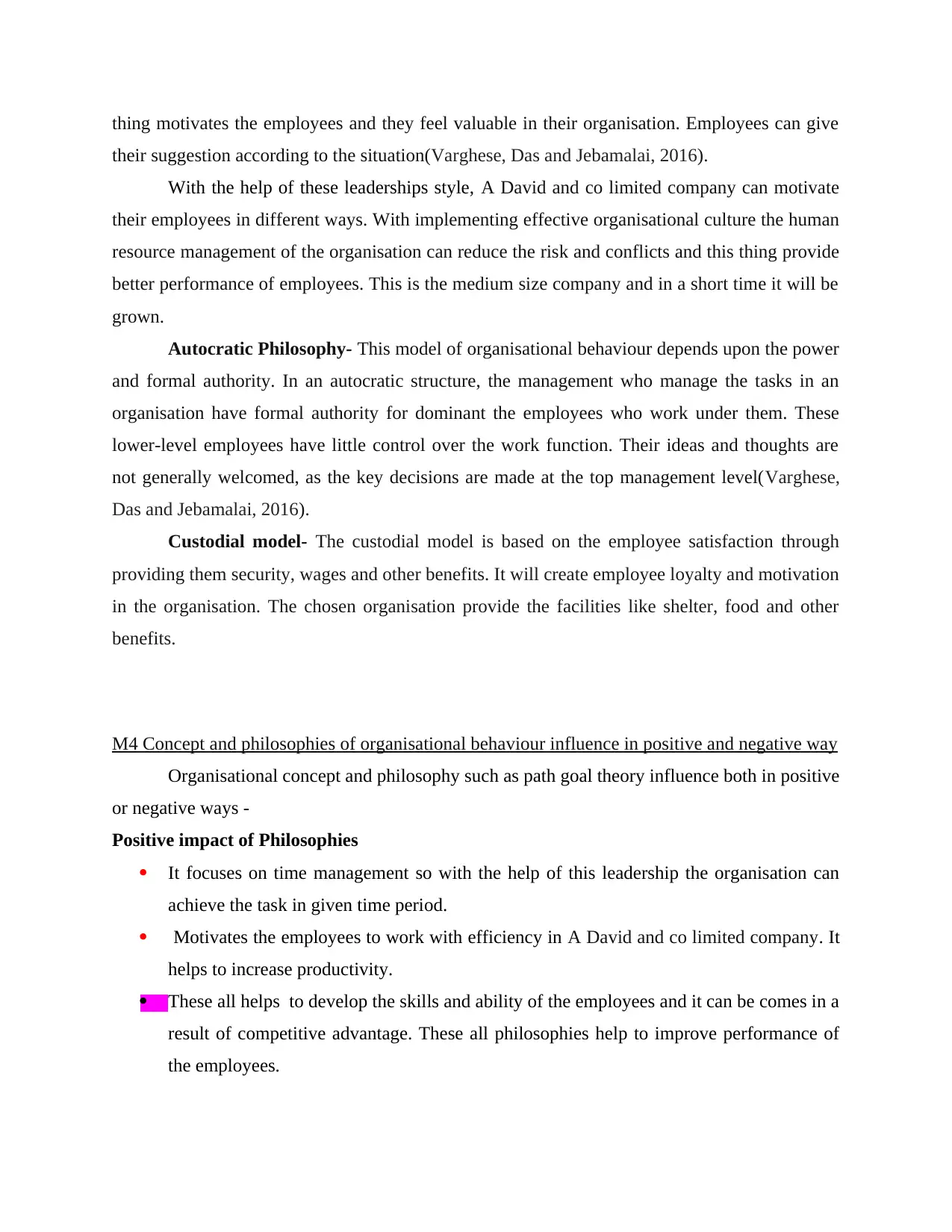
thing motivates the employees and they feel valuable in their organisation. Employees can give
their suggestion according to the situation(Varghese, Das and Jebamalai, 2016).
With the help of these leaderships style, A David and co limited company can motivate
their employees in different ways. With implementing effective organisational culture the human
resource management of the organisation can reduce the risk and conflicts and this thing provide
better performance of employees. This is the medium size company and in a short time it will be
grown.
Autocratic Philosophy- This model of organisational behaviour depends upon the power
and formal authority. In an autocratic structure, the management who manage the tasks in an
organisation have formal authority for dominant the employees who work under them. These
lower-level employees have little control over the work function. Their ideas and thoughts are
not generally welcomed, as the key decisions are made at the top management level(Varghese,
Das and Jebamalai, 2016).
Custodial model- The custodial model is based on the employee satisfaction through
providing them security, wages and other benefits. It will create employee loyalty and motivation
in the organisation. The chosen organisation provide the facilities like shelter, food and other
benefits.
M4 Concept and philosophies of organisational behaviour influence in positive and negative way
Organisational concept and philosophy such as path goal theory influence both in positive
or negative ways -
Positive impact of Philosophies
It focuses on time management so with the help of this leadership the organisation can
achieve the task in given time period.
Motivates the employees to work with efficiency in A David and co limited company. It
helps to increase productivity.
These all helps to develop the skills and ability of the employees and it can be comes in a
result of competitive advantage. These all philosophies help to improve performance of
the employees.
their suggestion according to the situation(Varghese, Das and Jebamalai, 2016).
With the help of these leaderships style, A David and co limited company can motivate
their employees in different ways. With implementing effective organisational culture the human
resource management of the organisation can reduce the risk and conflicts and this thing provide
better performance of employees. This is the medium size company and in a short time it will be
grown.
Autocratic Philosophy- This model of organisational behaviour depends upon the power
and formal authority. In an autocratic structure, the management who manage the tasks in an
organisation have formal authority for dominant the employees who work under them. These
lower-level employees have little control over the work function. Their ideas and thoughts are
not generally welcomed, as the key decisions are made at the top management level(Varghese,
Das and Jebamalai, 2016).
Custodial model- The custodial model is based on the employee satisfaction through
providing them security, wages and other benefits. It will create employee loyalty and motivation
in the organisation. The chosen organisation provide the facilities like shelter, food and other
benefits.
M4 Concept and philosophies of organisational behaviour influence in positive and negative way
Organisational concept and philosophy such as path goal theory influence both in positive
or negative ways -
Positive impact of Philosophies
It focuses on time management so with the help of this leadership the organisation can
achieve the task in given time period.
Motivates the employees to work with efficiency in A David and co limited company. It
helps to increase productivity.
These all helps to develop the skills and ability of the employees and it can be comes in a
result of competitive advantage. These all philosophies help to improve performance of
the employees.
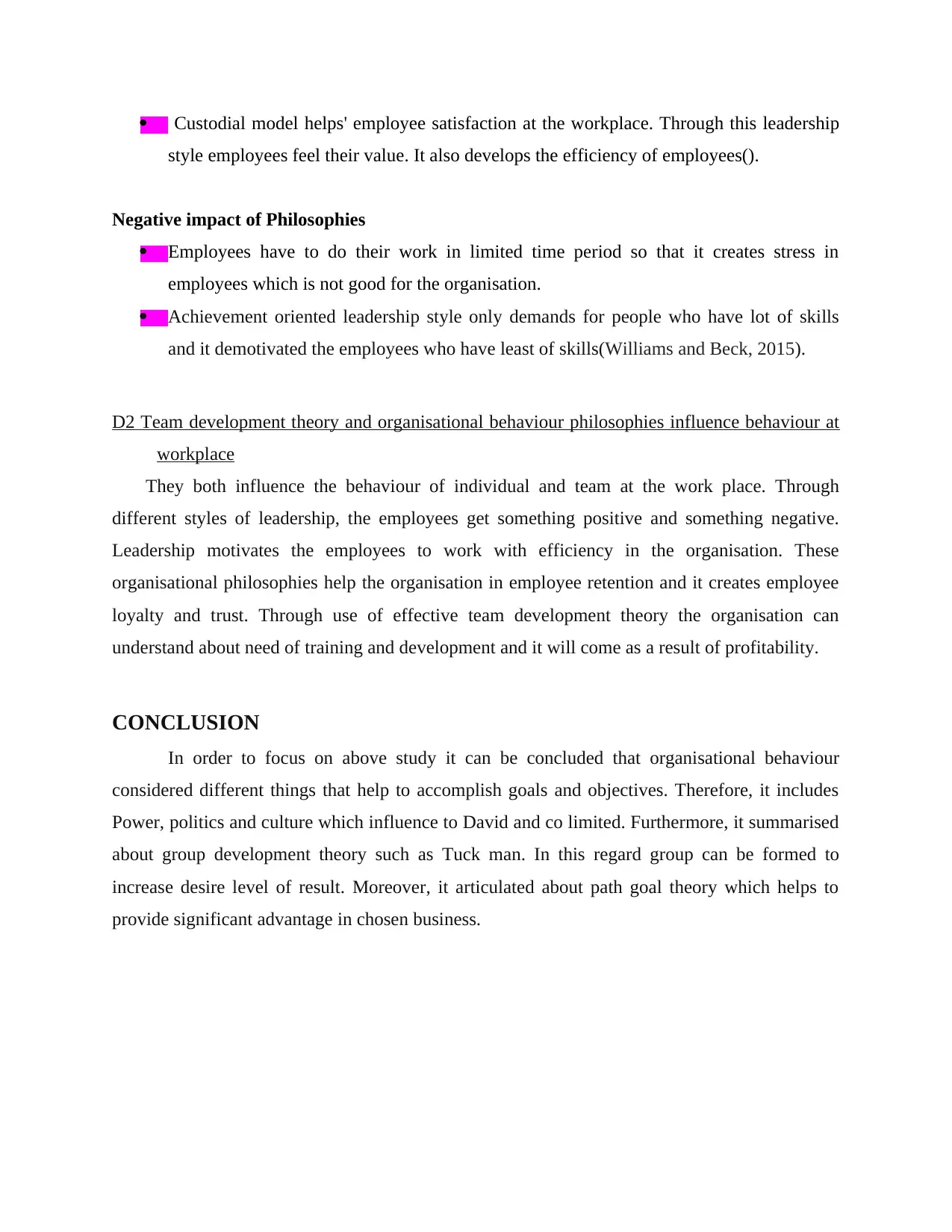
Custodial model helps' employee satisfaction at the workplace. Through this leadership
style employees feel their value. It also develops the efficiency of employees().
Negative impact of Philosophies
Employees have to do their work in limited time period so that it creates stress in
employees which is not good for the organisation.
Achievement oriented leadership style only demands for people who have lot of skills
and it demotivated the employees who have least of skills(Williams and Beck, 2015).
D2 Team development theory and organisational behaviour philosophies influence behaviour at
workplace
They both influence the behaviour of individual and team at the work place. Through
different styles of leadership, the employees get something positive and something negative.
Leadership motivates the employees to work with efficiency in the organisation. These
organisational philosophies help the organisation in employee retention and it creates employee
loyalty and trust. Through use of effective team development theory the organisation can
understand about need of training and development and it will come as a result of profitability.
CONCLUSION
In order to focus on above study it can be concluded that organisational behaviour
considered different things that help to accomplish goals and objectives. Therefore, it includes
Power, politics and culture which influence to David and co limited. Furthermore, it summarised
about group development theory such as Tuck man. In this regard group can be formed to
increase desire level of result. Moreover, it articulated about path goal theory which helps to
provide significant advantage in chosen business.
style employees feel their value. It also develops the efficiency of employees().
Negative impact of Philosophies
Employees have to do their work in limited time period so that it creates stress in
employees which is not good for the organisation.
Achievement oriented leadership style only demands for people who have lot of skills
and it demotivated the employees who have least of skills(Williams and Beck, 2015).
D2 Team development theory and organisational behaviour philosophies influence behaviour at
workplace
They both influence the behaviour of individual and team at the work place. Through
different styles of leadership, the employees get something positive and something negative.
Leadership motivates the employees to work with efficiency in the organisation. These
organisational philosophies help the organisation in employee retention and it creates employee
loyalty and trust. Through use of effective team development theory the organisation can
understand about need of training and development and it will come as a result of profitability.
CONCLUSION
In order to focus on above study it can be concluded that organisational behaviour
considered different things that help to accomplish goals and objectives. Therefore, it includes
Power, politics and culture which influence to David and co limited. Furthermore, it summarised
about group development theory such as Tuck man. In this regard group can be formed to
increase desire level of result. Moreover, it articulated about path goal theory which helps to
provide significant advantage in chosen business.
⊘ This is a preview!⊘
Do you want full access?
Subscribe today to unlock all pages.

Trusted by 1+ million students worldwide
1 out of 14
Related Documents
Your All-in-One AI-Powered Toolkit for Academic Success.
+13062052269
info@desklib.com
Available 24*7 on WhatsApp / Email
![[object Object]](/_next/static/media/star-bottom.7253800d.svg)
Unlock your academic potential
Copyright © 2020–2026 A2Z Services. All Rights Reserved. Developed and managed by ZUCOL.





